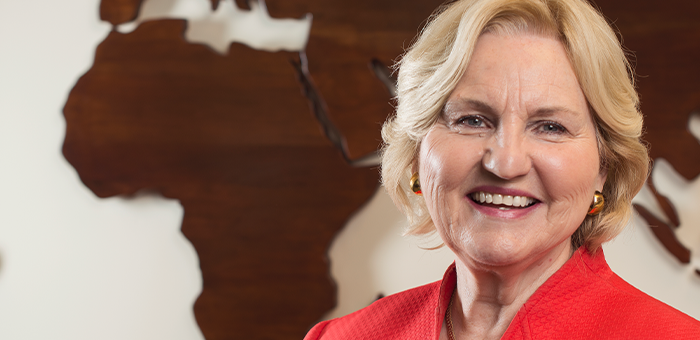Rich Stearns is president emeritus of World Vision U.S. He joined World Vision as its president in 1998 after working for several Fortune 500 companies, including serving as president of Parker Brothers Games and Lenox. Donations tripled during his first decade as president, making World Vision U.S. a billion-dollar organization. He is the author of “The Hole In Our Gospel,” “Unfinished” and “Lead Like It Matters to God.” Stearns holds a bachelor’s degree in neurobiology from Cornell University and a master’s degree in business administration from the Wharton School at the University of Pennsylvania.

This past season has been exhausting and overwhelming for anyone in a position of leadership. Virtually every leader of every organization in the world was simultaneously confronted with extraordinary challenges and agonizing decisions. No one was exempt.
As a ministry leader, after all you have been through, if you feel drained, if you feel numb, even if you feel like a failure — it’s OK. That’s actually a very normal and human reaction to the kinds of pressures and stresses you’ve had to weather over the past year. And undoubtedly, the pressures of navigating your ministry through COVID have revealed some other “leaks in the boat” that were lying below the surface before the crisis: staffing issues, budget pressures, factions and perhaps political and racial divisions in your church, ministry or community.
What Did God Teach You in the Darkness?
A recent Barna survey revealed that 29 percent of pastors had given “real, serious consideration to quitting full time ministry within the last year.” That is an alarming figure. There’s a well-known quote from the late V. Raymond Edmond that goes like this: “Never doubt in the dark what God told you in the light.” If you’re one of those discouraged pastors or leaders, it’s important to remember the things you knew to be true about your ministry before COVID: God called you for a purpose, and he is using you and your team to make a difference for his kingdom.
But there’s also a corollary to Edmond’s statement: “Remember in the light what God taught you in the darkness.” God will often use challenges, hardships and conflict to take us deeper in our relationship with him. What have you learned about yourself over the past year? What has God revealed to you about the health of your ministry, your priorities and how they should change?
Good News: It Doesn’t Depend on You
Discouragement and burnout are things that every leader experiences periodically in the course of their ministry and career. Sustaining your leadership over years and even decades requires grit, perseverance and an abiding belief that God is using you to accomplish his purposes — even when you can’t see or feel the tangible fruit. But there is a simple and critical truth that is crucial to sustaining you during these inevitable periods of doubt and discouragement, a truth that Christian leaders should inscribe on their office walls: What God is doing through you involves you but does not depend on you. Let that truth wash over you for a moment. Yes, God is using you in specific ways to accomplish his purposes, but the outcomes do not depend on your abilities, your programs or, for that matter, your feelings. In many cases, you may not even be able to see the true impact of your service.
Put yourself in the shoes of Peter in the late first century. As the leader of the fledgling church in the Roman Empire, not only was Peter ‘out of his depth,’ he was facing brutal oppression and opposition both from Rome and from the Jewish leadership. Imagine how overwhelmed and inadequate he must have felt. By the end of that century, 11 of the 12 original disciples had been murdered as martyrs, including Peter himself.
On the surface, Peter and the early church looked like total failures. And yet, in spite of all this, God was at work. What God was doing through Peter involved him but did not depend on him. Peter was simply asked to be faithful, to persevere, to do his best — trusting God for the outcome. Peter couldn’t see that the movement he led would become the largest religious movement in human history, numbering more than 2 billion followers of Christ today. You can look at dozens of other leaders in Scripture — Abraham, Moses, David, Daniel, Elijah, Jeremiah, etc. They all faced tremendous opposition and controversy. None of them were perfect leaders; many were deeply flawed. But God used them to accomplish his purposes anyway. God simply asked them to be obedient and to do their best.
You’re Called to Be Faithful Not Successful
I spent 20 years as the president of World Vision U.S. My job description literally involved tackling the most difficult problems facing the human race: poverty, pandemic diseases, refugee migrations, civil wars, famines, natural disasters, human trafficking and even genocide. No matter how hard we worked or how much money we raised, it often felt like we were trying to empty the ocean with a thimble. To make it worse, every mistake I made as a leader (and I made lots of them), sometimes cost lives — children and families we couldn’t help due to my inadequacies.
One of the things that kept me going for two decades was a story I had heard about Mother Teresa. She became world famous for her small ministry caring for the sick and the poor in Calcutta. Her tiny group of nuns situated in a veritable ocean of poverty and human suffering faced overwhelming odds. When she was once asked by a U.S. senator if she sometimes felt like a failure, since poverty in Calcutta was even worse than when she had begun her ministry decades earlier, Mother Teresa’s reply redefined our naive notions of success: “My dear senator,” she said, “God did not call me to be successful, he called me to be faithful.” Faithful, not successful.
You see, when we turn over control of our ministries to God and trust him for the outcomes, he is the one who sustains us and leads us through our dry spells. Whatever you may be facing in your ministry and regardless of the mistakes you may have made, you, too, can find comfort in this profound truth: What God is doing through you involves you, but does not depend on you. Your job is simply to be faithful.
This article originally appeared in Evangelicals magazine.



 View All Articles
View All Articles 




























